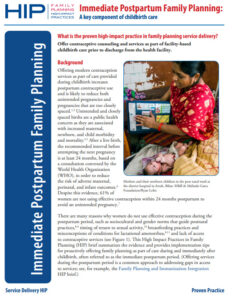
Offering modern contraception services as part of care provided during childbirth increases postpartum contraceptive use and is likely to reduce both unintended pregnancies and pregnancies that are too closely spaced.1,2 Unintended and closely spaced births are a public health concern as they are associated with increased maternal, newborn, and child morbidity and mortality.3-5 After a live birth, the recommended interval before attempting the next pregnancy is at least 24 months, based on a consultation convened by the World Health Organization (WHO), in order to reduce the risk of adverse maternal, perinatal, and infant outcomes.6 Despite this evidence, 61% of women are not using effective contraception within 24 months postpartum to avoid an unintended pregnancy.7
There are many reasons why women do not use effective contraception during the postpartum period, such as sociocultural and gender norms that guide postnatal practices,8,9 timing of return to sexual activity,10 breastfeeding practices and misconceptions of conditions for lactational amenorrhea,8,11 and lack of access to contraceptive services (see Figure 1). This High Impact Practices in Family Planning (HIP) brief summarizes the evidence and provides implementation tips for proactively offering family planning as part of care during and immediately after childbirth, often referred to as the immediate postpartum period. (Offering services during the postpartum period is a common approach to addressing gaps in access to services; see, for example, the Family Planning and Immunization Integration HIP brief.)
WHO recommends that women receive information on family planning and the health and social benefits of birth spacing during antenatal care, immediately after birth, and during postpartum and well-baby care, including immunization and growth monitoring.12 Each visit to a health professional offers a unique opportunity to screen for, counsel, and offer family planning services. Yet each opportunity requires deliberate attention to organize services, update policies and provider practices, and mobilize resources for successful implementation. Facility-based childbirth services offers an ideal platform to reach women and their partners with family planning information and services, provided women’s right to make a full and informed choice are respected.
Immediate postpartum family planning (PPFP) is one of several proven HIPs identified by a technical advisory group of international experts. A proven practice has sufficient evidence to recommend widespread implementation as part of a comprehensive family planning strategy, provided that there is monitoring of coverage, quality, and cost as well as implementation research to strengthen impact.13 For more information about other HIPs, see http://www.fphighimpactpractices.org/overview.